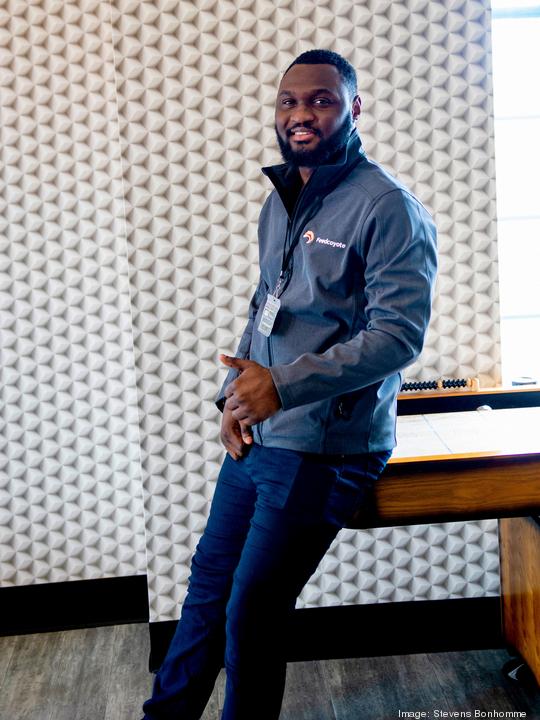
Having lived in five states since he arrived in the U.S. from Haiti in 2013, Stevens Bonhomme has never been afraid to discover a new part of the country.
“I’ve had a chance to live in so many places and experience so many great things, so I’m kind of equipped to live anywhere,” Bonhomme recently told me. “I always make sure that I can immerse myself in the community and learn from people ... everywhere I have lived.”
Since September, Bonhomme has called Paducah, Kentucky, home, by way of Seattle. The move stems from his startup, Feedcoyote, being named in July as one of five winners of the 1ST50K competition held jointly between business incubator Sprocket, based out of Paducah, and Codefi, based out of Cape Girardeau, Missouri.
All winners received $50,000 with the stipulation that they move to one of the two cities with two moving to Paducah and three to the Southeast Missouri city. Carbondale, Illinois-founded EWAGERS, an esports skill-based betting platform, was the other startup that now calls Paducah home. Codefi has been sponsoring the 1ST50K competition since 2015, with Sprocket forming a partnership with them in 2021.
Sprocket executive director Monica Bilak said that Feedcoyote stood out from finalists, in part, by addressing a significant issue in the freelancer market — particularly when it came to UX/UI designers wanting to grow a digital market product.
“The platform made sense from a growth market perspective and solved a good problem,” Bilak said in an email.
Bilak added that her organization will be running its own Paducah 1ST50K in 2023, with its own team of coaches and engineers.
Feedcoyote serves as a collaboration platform for freelancers. It was created to address both the increasing numbers of freelancers in the digital space, and the resulting increased need for connections to other freelancers — such as if they face a project that requires a subcontractor. Users can use the platform not only to share files seamlessly, but also pay the appropriate party.
“They experience economic isolation, and they are losing so much money in terms of deals, because they are lacking something in the whole mechanism,” Bonhomme said of the freelancer community. “We realized we had a common problem, so we decided to put the platform together, which is great because we use our own platform to solve our problems.”
According to a market analysis completed by Bonhomme and his team, 59 million U.S. workers did some form of freelance work in 2021, generating approximately $48.3 billion in combined earnings. It is projected that with year-over-year growth of 10.6%, that number could roughly double in size by 2028 to $97.4 billion.
The platform’s business model runs off two tiers of access: A free version and a premium version. Although those using the free version can only carry through five transactions before users are charged a small service fee, premium members can have full, unlimited access to all its offerings for $8.99 a month or $99.99 a year. Recently, the Feedcoyote had approximately 200 users on the free version and 15 on the paid version.
A warm welcome
Although he has only been in Western Kentucky for two months, Bonhomme has already been able to make many connections with fellow founders, investors and other key players in the state’s entrepreneurial ecosystem. In turn, many Feedcoyote community members are from Kentucky. Bonhomme has not yet met with members of the state’s ecosystem in larger cities like Louisville and Lexington, but he looks to make those trips in 2023.
Bonhomme said the connectivity he experienced thus far in the commonwealth has been a welcome change from the somewhat stagnant nature that he was encountering in the massive tech hub that is Seattle, where he worked for Microsoft as a program manager (and still does remotely).
“It’s easier to meet somebody on the street here and talk to them,” Bonhomme said. “People around here seem to be very welcoming, so I guess that also speaks to how tight the community is here.”
Following the winnings from the initial competition and a $50,000 match from Keyhorse Capital in November, Bonhomme and his team of five are launching a seed round in which they hope to raise a total of $3 million. In addition, they are looking for a lead investor, but are also accepting smaller funding in the form of Simple Agreement for Future Equity (SAFE) agreement.
Bonhomme said the money raised in the seed round would primarily go toward ramping up the company’s sales and marketing efforts to drive up the number of users.
Feedcoyote is currently generating about $135 a month from subscription fees, and the site is growing by about 30 users a month. In 2023, Bonhomme hopes to be able to start welcoming international users to the platform.
Given where he started, he said, essentially, that there is no better teacher than experience when it comes to the startup world.
“You will never really be ready to start something” Bonhomme said, “But you can start something and learn along the way, make mistakes and improve and get better at it.”






